Preventing Periodontal Disease: Protect Your Gums and Teeth
Periodontal disease damages the gums and supporting structures of the teeth. It starts with plaque buildup, leading to gum inflammation and infection. Without treatment, it progresses to periodontitis, which causes gum recession, bone loss, and tooth damage. Poor oral hygiene, smoking, and health conditions increase the risk of periodontal disease. Early detection and proper care prevent gum damage and improve oral health. Brushing, flossing, and regular dental cleanings remove plaque and strengthen gum tissue. Treating early-stage gum disease reduces inflammation and prevents tooth loss. Understanding how to prevent periodontal disease ensures long-term dental health. Let’s explore effective ways to protect your gums and teeth from periodontal disease.
Maintain Good Oral Hygiene
Brushing and flossing daily prevent plaque buildup and gum inflammation. Brush twice a day using a soft-bristled toothbrush and fluoride toothpaste. Clean along the gumline using gentle, circular motions to remove plaque. Floss daily to clean between teeth and under the gumline. Use an antibacterial mouthwash to kill bacteria and reduce plaque formation. Brushing the tongue removes bacteria and improves breath freshness. Replace your toothbrush every three months for better cleaning efficiency. Consistent oral hygiene reduces plaque and strengthens gum tissue. Clean teeth and gums prevent cavities and reduce gum disease risk. Proper oral care supports long-term gum health and tooth strength.
Schedule Regular Dental Checkups
Professional dental cleanings remove plaque and tartar that brushing and flossing miss. Dentists use ultrasonic tools to clean beneath the gumline and reduce inflammation. Regular dental exams allow early detection of gum disease. Dentists measure gum pocket depth to check for signs of periodontitis. Early detection allows faster treatment and reduces complications. Professional fluoride treatments strengthen enamel and reduce sensitivity. Dentists recommend checkups every six months for better gum health. Scaling and root planing treat mild gum disease and prevent it from progressing. Early treatment increases tooth stability and reduces inflammation. Regular dental visits protect gums and improve overall dental health.
Eat a Gum-Friendly Diet
A balanced diet strengthens gums and improves immune response. Leafy greens, dairy products, and lean proteins supply calcium and vitamin D, which strengthen gum tissue. Crunchy fruits and vegetables, like apples and carrots, clean teeth and stimulate saliva production. Vitamin C from citrus fruits strengthens blood vessels and reduces gum inflammation. Omega-3 fatty acids from fish reduce gum swelling and improve healing. Avoid sugary snacks and drinks, which feed bacteria and increase plaque buildup. Staying hydrated improves saliva production and reduces dry mouth. Better nutrition strengthens gum tissue and reduces sensitivity. A nutrient-rich diet supports long-term gum health and tooth strength.
Quit Smoking and Tobacco Use
Smoking weakens gums and increases the risk of periodontal disease. Nicotine reduces blood flow to the gums, slowing healing and increasing gum recession. Tobacco use increases plaque and tartar buildup, leading to deeper gum pockets and bone loss. Smokers have a higher risk of tooth loss and gum infections. Quitting smoking reduces inflammation and improves gum health within weeks. Better blood flow strengthens gum attachment and improves healing. Avoiding tobacco products reduces tooth staining and improves breath freshness. Improved gum health reduces the need for complex dental treatments. Stopping smoking protects gum tissue and strengthens overall dental health.
Manage Stress to Reduce Grinding and Gum Strain
Stress increases teeth grinding (bruxism) and weakens gum tissue. Grinding wears down enamel and increases pressure on the gums. Stress also raises cortisol levels, which weaken the immune system and increase inflammation. Wearing a night guard reduces grinding pressure and protects teeth and gums. Relaxation techniques like deep breathing, meditation, and yoga reduce jaw tension. Better sleep quality improves immune response and supports gum health. Reducing caffeine and alcohol intake lowers stress levels and improves sleep. Lower stress levels improve gum strength and reduce inflammation. Managing stress protects teeth and gums from long-term damage.
Treat Early Signs of Gum Disease
Early-stage gum disease (gingivitis) is reversible with proper care. Red, swollen, and bleeding gums signal early gum inflammation. Treating gingivitis early prevents it from progressing to periodontitis. Dentists treat gingivitis with scaling and root planing to remove plaque and tartar. Antibacterial mouthwash reduces bacteria and improves gum healing. Improved brushing and flossing techniques reduce plaque buildup and strengthen gum attachment. Dentists recommend deep cleaning every six months for patients with mild gum disease. Treating inflammation early reduces tooth sensitivity and strengthens gum tissue. Stronger gums prevent tooth loss and improve long-term dental comfort.
Avoid Sugary and Acidic Foods
Sugary and acidic foods weaken enamel and increase plaque formation. Soda, candy, and processed snacks feed bacteria that cause gum inflammation. Acidic drinks like citrus juice and soda erode enamel and irritate gums. Sticky sweets cling to teeth, increasing plaque buildup. Rinse your mouth with water after consuming sugary or acidic foods. Eating sugar-free gum after meals increases saliva flow and reduces plaque. Choosing whole fruits over processed snacks reduces sugar intake. Better food choices strengthen gum tissue and protect enamel. Avoiding harmful foods reduces gum inflammation and improves long-term dental strength.
Periodontal disease damages gums and increases the risk of tooth loss. Brushing, flossing, and using antibacterial mouthwash reduce plaque and strengthen gum tissue. Regular dental checkups allow early detection and treatment of gum disease. Eating a balanced diet and staying hydrated improve gum health and immune strength. Quitting smoking reduces gum inflammation and strengthens tooth support. Managing stress reduces grinding and improves gum comfort. Treating early signs of gum disease prevents further complications and improves overall dental health. Investing in proper gum care ensures stronger teeth and better smile confidence. Healthy gums create a stronger, more comfortable smile.
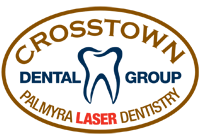


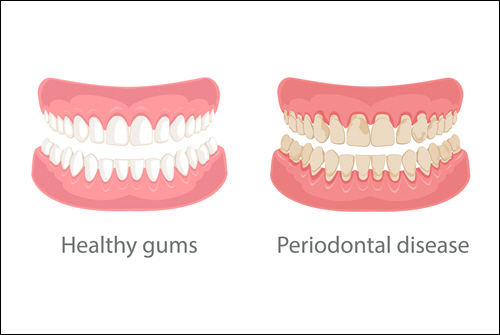
 Gum disease is an infection of the tissues that hold your teeth in place. It begins when plaque—a sticky film of bacteria—builds up on the teeth and along the gumline. If plaque isn’t removed through regular brushing and flossing, it hardens into tartar, which is difficult to remove and can irritate the gums. This irritation causes gingivitis, the first stage of gum disease, characterized by red, swollen gums that may bleed when brushing or flossing.
Gum disease is an infection of the tissues that hold your teeth in place. It begins when plaque—a sticky film of bacteria—builds up on the teeth and along the gumline. If plaque isn’t removed through regular brushing and flossing, it hardens into tartar, which is difficult to remove and can irritate the gums. This irritation causes gingivitis, the first stage of gum disease, characterized by red, swollen gums that may bleed when brushing or flossing.
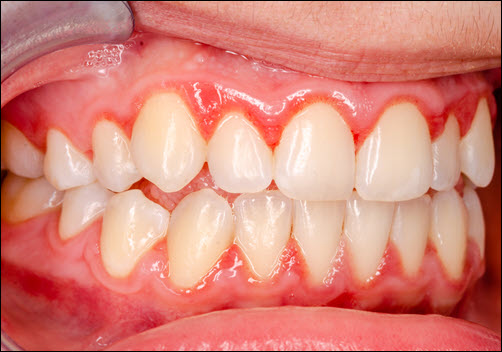 Gingivitis often creeps up without any pain, so it’s essential to be aware of its symptoms:
Gingivitis often creeps up without any pain, so it’s essential to be aware of its symptoms:
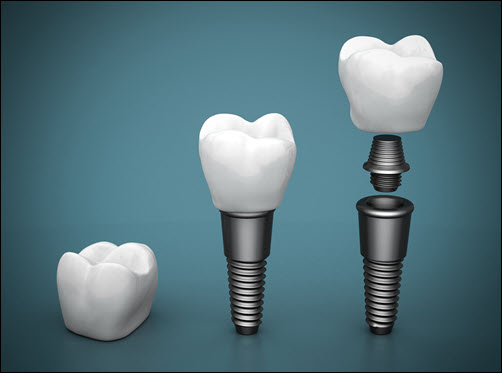 Bone Density
Bone Density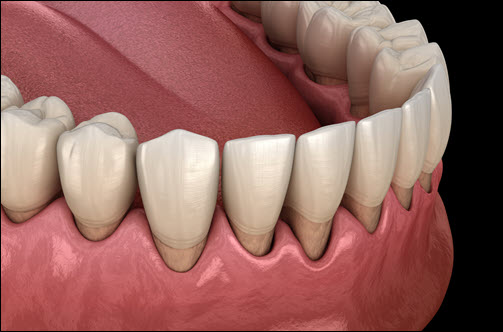
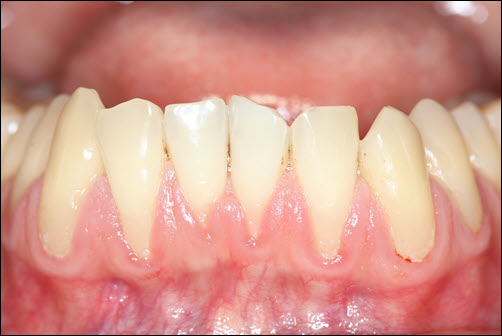 Braces – As braces realign the teeth, it can sometimes cause gum recession.
Braces – As braces realign the teeth, it can sometimes cause gum recession.